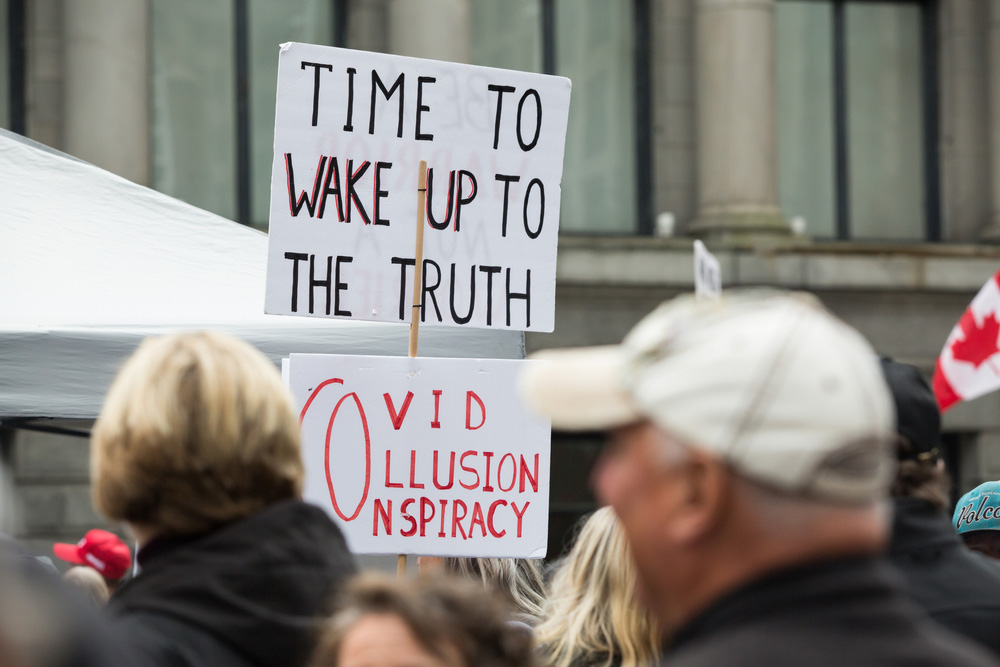It might be hard to see anti-masker and anti-vaccination groups marching through downtown Vancouver and not feel a mix of bewilderment and rage. But falling into a conspiracy rabbit hole is not as uncommon or unlikely as you might think, says one expert.
“We’ve all believed something that isn’t true at some point. We’ve all shared a wrong piece of information on social media,” says Jaigris Hodson, associate professor and Canada Research Chair in Digital Communication for the Public Interest at Royal Roads University.
“We’re all one strong emotion away from falling prey to some kind of misinformation.”
Hodson’s research focuses on how people interact with social media and the ways that misinformation can be reduced on online platforms like Twitter, Facebook and YouTube. She’s seen an increase in conspiratorial sharing in Canada during COVID-19, paralleling that happening south of the border.
QAnon, a right-wing conspiracy theory community that was linked to the Jan. 6 insurrection at the U.S. Capitol, has also found a foothold here. Membership in popular Canadian QAnon communities has skyrocketed into the thousands. And young people are finding these online communities with unprecedented ease.
“We’re seeing people believe that the COVID vaccination is a conspiracy for Bill Gates to put microchips in people,” Hodson said. “These things can sound crazy, but I think it’s important that we really try to understand where these beliefs come from.”
Conspiracy theories have always flourished in times of uncertainty and despair, notes Hodson. For instance, there was a significant anti-vaccine movement during the Spanish flu.
But the internet has changed everything, and while it can be a tool for good, Hodson says, it also allows misinformation to spread rapidly on an unprecedented scale.
“What digital technologies do is they allow us to find each other more quickly.... It helps us find communities,” she says. “The darker side of that kind of connectivity is that people who have more conspiratorial views can find each other as well.”
Hodson says it’s also a powerful organizing force, allowing people to gather and scheme.
While it’s easy to demonize conspiracy communities or the people who fall into them, Hodson says prevention depends on understanding why misinformation is so attractive.
Hodson says the rise of radical conspiracy theories is the result of a systemic failure.
“There are complex motivations that drive people to conspiracy theories,” she says. “One of those things is the desire to be part of a community, which is something we all experience. You’ll find that some people who get involved in theories are feeling outcast by other communities in their lives. One of the things they find when they go to QAnon, for instance, is a community that’s accepting of them no matter what.”
Another driver is the desire to feel control over the stressful, confusing and scary world around us. As our world gets increasingly complex and people consume more information through social media and 24-hour-news, the simple narratives put forward by conspiracy theories offer a simpler alternative, Hodson says.
“To these communities, there’s a good side and an evil side, and they know that the good is ultimately going to win over the evil. That’s the other thing — conspiracy theorists legitimately believe they’re on the side of good.”
There’s also an aspect of disenfranchisement, Hodson says. “It’s been found that people who lose their jobs, for instance, are more susceptible to radicalization. They’re struggling and confused in the face of a tragic event, and so they try to exercise control in the face of that event.”
For many, the pandemic represents the ultimate loss of control, exacerbating job insecurity and financial instability. It makes just going outside the source of anxiety and fear. Hodson says that believing the pandemic is an elaborate conspiracy theory is a coping mechanism for some people.
“Wouldn’t it be easier if the pandemic was fake? Wouldn’t it be less scary?... Once you start to understand the motivations and theories behind people who believe in conspiracy theories, you begin to see it’s maybe not so illogical after all.”
Young people are particularly vulnerable to conspiracy theories, Hodson says, for a few reasons. For one, they’re disproportionately disenfranchised by the world we live in.
“This group is a generation that is worse off than their parents and their grandparents. A young person can look around at that, and just think — there’s got to be a reason why things are so terrible for us. There’s got to be a way we can fight against this,” she said.
“The world today can be a horrible place to be, and it leaves people feeling very vulnerable, which in turn makes them more vulnerable to conspiracy theories.”
Social media enables and even encourages the spread of radicalizing information. YouTube has been heavily criticized for enabling the “Alt-Right Pipeline,” as its algorithm leads users to increasingly extreme and racist right-wing content.
“The YouTube algorithms are doing this to keep you watching. And the algorithms on other social media networks work similarly: they want to keep you on there for as long as possible so they can keep making money. So they’re going to deliver you content that arouses an emotional response by showing you something interesting or exciting or that makes you feel angry.”
Hodson believes many changes are needed to curb the spread of misinformation.
“We need to start treating social media platforms like media companies, and then create a set of journalistic standards for those companies to stop the spread of fake news. We also need those companies to commit to fighting racism and white supremacy on those platforms.”
Conspiratorial thinking is usually a response to a variety of unmet needs, Hodson stresses. The more that people feel left behind by society, uncared for by government or uncertain about their place in the world, the easier it is to fall into conspiratorial communities.
“We need to figure out how to take care of people in society so that they don’t fall through the cracks and start looking for answers in conspiracy theories,” Hodson explains. “So that means providing a stronger social safety net, so that people don’t feel so lost and alone if they lose their jobs or if they’re financially unstable.
“We need to build a society that gives young people hope, so they’re not finding hope in conspiracy theories and misinformation. We need to create better anti-racism education and create a better foundation for critical thinking skills. We need to ask — ‘What do we need to build into society to take care of our young people?’
“There are things that we can do as individuals or as families towards the people we love, and then there are things that organizations, communities, and policy makers have to do. And we can’t have one without the other.”
Hodson says it’s important to not demonize or completely alienate the people who believe in conspiracy theories.
“The only way that things are ever going to get better is if we reach out with empathy and compassion, find the real problems at play, and work on making our world a place where people don’t have to seek solace in these communities.” ![]()
Read more: Coronavirus, Media
















Tyee Commenting Guidelines
Comments that violate guidelines risk being deleted, and violations may result in a temporary or permanent user ban. Maintain the spirit of good conversation to stay in the discussion.
*Please note The Tyee is not a forum for spreading misinformation about COVID-19, denying its existence or minimizing its risk to public health.
Do:
Do not: